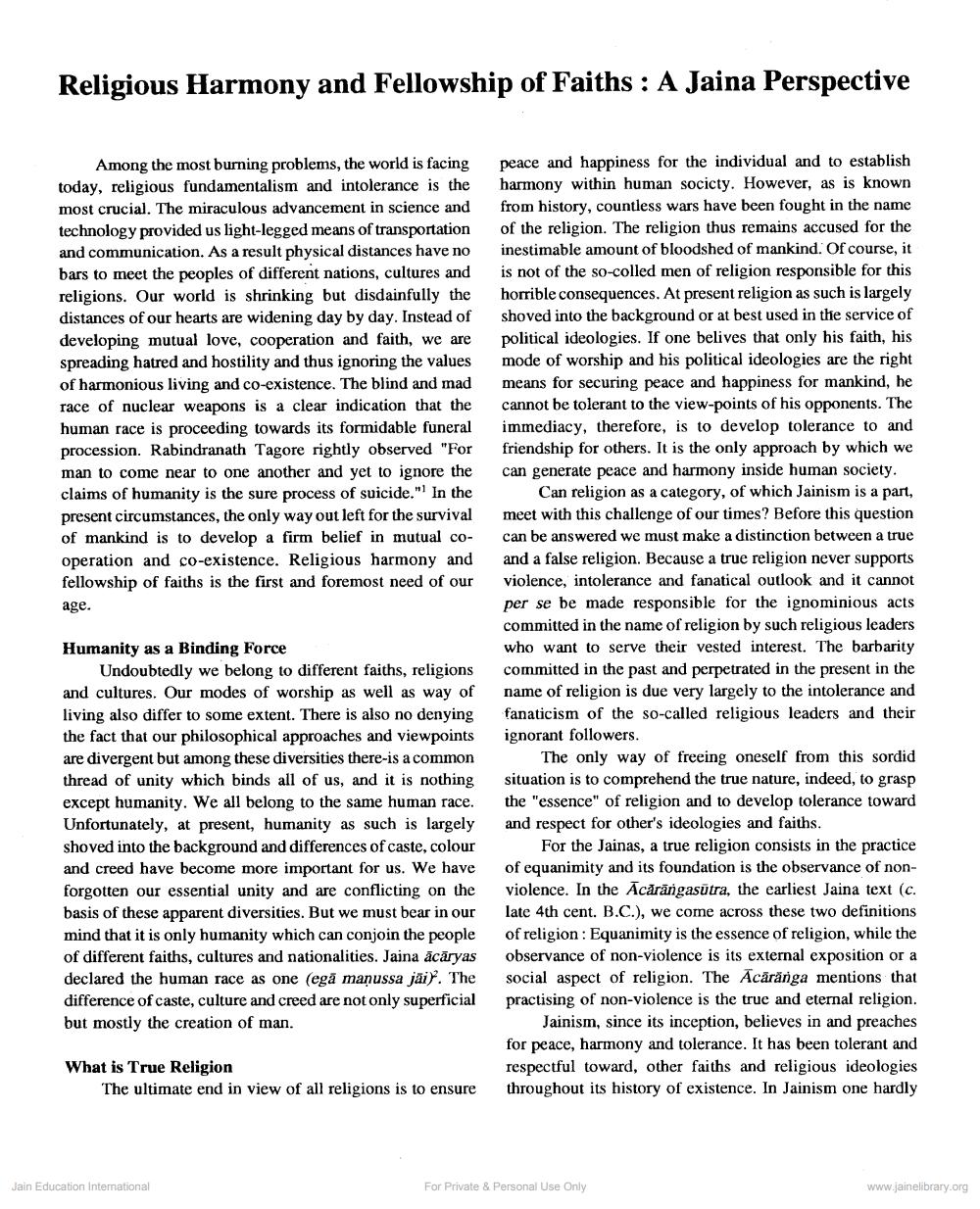________________
Religious Harmony and Fellowship of Faiths : A Jaina Perspective
Among the most burning problems, the world is facing today, religious fundamentalism and intolerance is the most crucial. The miraculous advancement in science and technology provided us light-legged means of transportation and communication. As a result physical distances have no bars to meet the peoples of different nations, cultures and religions. Our world is shrinking but disdainfully the distances of our hearts are widening day by day. Instead of developing mutual love, cooperation and faith, we are spreading hatred and hostility and thus ignoring the values of harmonious living and co-existence. The blind and mad race of nuclear weapons is a clear indication that the human race is proceeding towards its formidable funeral procession. Rabindranath Tagore rightly observed "For man to come near to one another and yet to ignore the claims of humanity is the sure process of suicide." In the present circumstances, the only way out left for the survival of mankind is to develop a firm belief in mutual co- operation and co-existence. Religious harmony and fellowship of faiths is the first and foremost need of our age.
peace and happiness for the individual and to establish harmony within human socicty. However, as is known from history, countless wars have been fought in the name of the religion. The religion thus remains accused for the inestimable amount of bloodshed of mankind. Of course, it is not of the so-colled men of religion responsible for this horrible consequences. At present religion as such is largely shoved into the background or at best used in the service of political ideologies. If one belives that only his faith, his mode of worship and his political ideologies are the right means for securing peace and happiness for mankind, he cannot be tolerant to the view points of his opponents. The immediacy, therefore, is to develop tolerance to and friendship for others. It is the only approach by which we can generate peace and harmony inside human society.
Can religion as a category, of which Jainism is a part, meet with this challenge of our times? Before this question can be answered we must make a distinction between a true and a false religion. Because a true religion never supports violence, intolerance and fanatical outlook and it cannot per se be made responsible for the ignominious acts committed in the name of religion by such religious leaders who want to serve their vested interest. The barbarity committed in the past and perpetrated in the present in the name of religion is due very largely to the intolerance and fanaticism of the so-called religious leaders and their ignorant followers.
The only way of freeing oneself from this sordid situation is to comprehend the true nature, indeed, to grasp the "essence" of religion and to develop tolerance toward and respect for other's ideologies and faiths.
F or the Jainas, a true religion consists in the practice of equanimity and its foundation is the observance of nonviolence. In the Acarangasūtra, the earliest Jaina text (c. late 4th cent. B.C.), we come across these two definitions of religion: Equanimity is the essence of religion, while the observance of non-violence is its external exposition or a social aspect of religion. The Acäränga mentions that practising of non-violence is the true and eternal religion.
Jainism, since its inception, believes in and preaches for peace, harmony and tolerance. It has been tolerant and respectful toward, other faiths and religious ideologies throughout its history of existence. In Jainism one hardly
Humanity as a Binding Force
Undoubtedly we belong to different faiths, religions and cultures. Our modes of worship as well as way of living also differ to some extent. There is also no denying the fact that our philosophical approaches and viewpoints are divergent but among these diversities there is a common thread of unity which binds all of us, and it is nothing except humanity. We all belong to the same human race. Unfortunately, at present, humanity as such is largely shoved into the background and differences of caste, colour and creed have become more important for us. We have forgotten our essential unity and are conflicting on the basis of these apparent diversities. But we must bear in our mind that it is only humanity which can conjoin the people of different faiths, cultures and nationalities. Jaina ācāryas declared the human race as one (egā maņussa jāi). The difference of caste, culture and creed are not only superficial but mostly the creation of man.
What is True Religion
The ultimate end in view of all religions is to ensure
Jain Education International
For Private & Personal Use Only
www.jainelibrary.org




